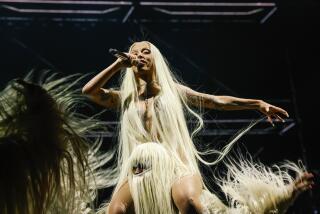A joyful, memorable evening with Chick Corea
Chick Corea has been rightfully praised throughout his long and productive career for his imagination, versatility and sheer musicality. What has often been overlooked is another, equally vital quality -- one that adds luster to everything he does: the sheer joy of making music.
On Friday night at Catalina Bar & Grill, Corea kicked off a too-brief three-night run fronting what he calls his Elektric Band. Consisting of saxophonist Eric Marienthal, guitarist Frank Gambale, bassist Jimmy Earl replacing original member John Patitucci and drummer Dave Weckl, the band was a state-of-the-art collection of contemporary jazz players. Simply playing on their own, they could have provided an entertaining evening of cutting-edge music. But with Corea’s ever enthusiastic presence -- as well, of course, as his extraordinary improvisational inventiveness -- bringing life and passion to the proceedings, it became a musical event to remember.
In addition to his effervescent leadership, Corea offered a program of music tailored to reach across stylistic genres: his own hard-driving “Rumble” and lighter-toned “Trance Dance,” Jimmy Heath’s classic bebop line “C.T.A.” and a lovely, classical-sounding piano-alto saxophone duet with Marienthal. On the opening “Rumble,” he moved to the front of the stage, picked up an over-the-shoulder keyboard and ripped off a series of dynamic solos, using a pitch wheel to bend his notes with the slip-sliding alacrity of a rock guitarist.
On “C.T.A.”, he shifted to the jazz-textured sounds of the Fender Rhodes electric piano, moving to acoustic grand piano for other numbers: repeated displays of versatility compounded with the obvious pleasure he experienced, and communicated, on each of the keyboards.
Speaking of rock guitarists, Gambale, who is surely one of the fastest-fingered instrumentalists anywhere, added a series of highflying, wildly wailing solos, directly contrasting with the bop-oriented offerings of Marienthal. Earl, playing six-string bass, provided several heated solos and a consistently solid rhythmic foundation, while Weckl’s torrential surge of percussion was filled with fascinating snippets of timbre and color.
Did the overflow crowd show up primarily because Corea is a high-ranking member of jazz royalty? Perhaps. But what they experienced had less to do with name value than with skill, inventiveness and Corea’s ineffable contact with the heart of musical creativity.
More to Read
The biggest entertainment stories
Get our big stories about Hollywood, film, television, music, arts, culture and more right in your inbox as soon as they publish.
You may occasionally receive promotional content from the Los Angeles Times.









